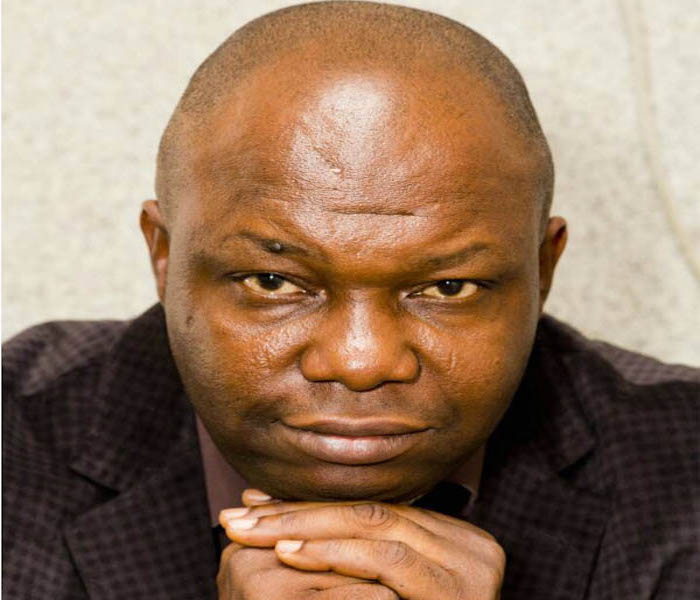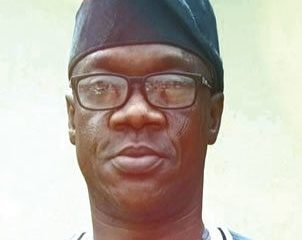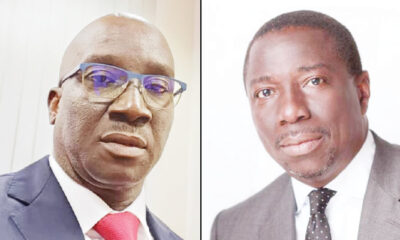Opinion
The Land Of Shameless Leaders (III)
Published
5 years agoon
By
Editor
Tunde Odesola
Act 4: Scene I
Deities don’t read newspapers. Humans do. Orita Gbaemu is the crossroads in Osogbo where deities are appeased in August at the commencement rites of Osun Osogbo, the globally acclaimed riverine festival that uplifts culture and restores worshippers’ souls.
From time out of mind, the Ataoja, once in every August, sits in splendour under a royal canopy on Gbaemu Road to commune with the founding deities of Osogbo and herald the celebration of fecundity, purity, cleansing, protection and wellness in the land.
Orita Gbaemu isn’t only about annual deities, however. It’s also renowned as the newspaper distribution epicentre where people throng daily to read newspapers and aerate comments on topical issues. Ironically, at Orita Gbaemu, like in all newsstands nationwide, comments are free, facts are scanty.
Scene II
Today, PhD students – Kiko, Beki and Solo – are doing their individual fieldwork in Osogbo, Kano and Umuahia respectively.
At Orita Gbaemu, Kiko examines how everyday people view governance and political leadership. He sits in the crowd with a rolling tape recorder concealed in his breast pocket, listening to the drift of conversations as readers factionally engage in political whataboutism.
FROM THE AUTHOR: OPINION: The Land Of Shameless Leaders
Now, whataboutism is the knee-jerk jagbajantis common among poor members of the public who respond to truthful allegations against their political leaders or parties by alleging that the greater sins lie with the accusers.
Scene III
In Nigeria’s political whataboutism, very poor folks vigorously defend allegations against their political parties or leader(s) by bringing up counter allegations that don’t clear the air on the allegation levelled against their parties or leader(s). They’ll say, “Oh, you accuse Sai Baba of nepotism and incompetence, WHAT ABOUT the stealing-is-not-corruption mantra of the Badluck years and the holier-than-thou corruption of the Ebora era?”
For a once-in-four-years measly porridge, this is the whataboutism you’ll likely get upon raising questions on the disturbing funds found in the coffers of Mama Piss, which made her enter into plea bargaining: “Who’s a saint? Didn’t Mama Piss manage her matrimonial home more effectively than the beautiful hairdresser whose ceaseless domestic fights triggered guns on A-Sore-Rock. If you’re patient and have the stomach for political stupidity, you’ll hear: “The Bullion Vans of Bourdillon are not as sordid as the Article of Halliburton.” This is what you get when the masses, who should be grieving and protesting their futurelessness, hotly argue in defence of their candidates for the title of the Most Successful Thief after Saint Sanny Abutcher, Maradona and Ebora.
Act 5: Scene 1
In the Railway area of Umuahia popularly referred to as Isi Gate, hawkers run wildly after vehicles to sell their wares. At one of the newsstands, Solo is reading a copy of ‘Light’, a fearless newspaper that constructively criticises government policies. The cover headline reads, “Repeal ex-govs, speakers pension payment now – US advises.”
Reader 1: Wetin concern US with our country?
Reader 2: What rubbish are you saying? If you can collect millions of dollars in donations from the US, you must be ready to take advice on how the millions should be spent.
FROM THE AUTHOR: OPINION: Juju, June 12 And Malami’s Killer-soldiers
Reader 3: The US should just leave our All-Pervasive-Congress-led government alone o. Did it advise the People-Dehumanising-Party when $2bn arms funds were being shared?
Solo continues to take notes.
Scene II
At the Galadima Road newspaper distribution centre in the commercially-busy Sabon Gari area of Kano, Beki mingles well with the crowd. She watches poor members of the public, who are adversely affected by government’s corruption and inaction, defend to the death insane government policies. She buys a copy of ‘The Truth’ newspaper, and sits down on a wooden bench provided by a vendor, who orders a free reader to get up for her.
A cover-page headline, “Two presidential jets go missing,” screams at Beki.
Reader 1: Irresponsible journalism! The jets aren’t missing. Both are in Dubai. One flew Baba’s daughter to Dubai while the other flew her pinhole camera there for her graduation photoshoot.
Reader II: What nonsense! At whose expense? Even the American president and his family pay from their personal purse when they embark on private trips.
Reader III: We’re not in America, we’re in paraDIES.
Scene III
The second lead story on the cover page catches Beki’s attention. It reads, “Anna-B bags degree in Wait-and-Get photography, paints Dubai red,”. From the illogical to the absurd, readers feast on the story, trading allegations for and against the vampires in government.
Soon, all hell broke loose with emotions boiling over and weapons and punches replacing speech. An hour later, the police, responding to a distress call, swoop on the scene, carting away edibles and arresting innocent traders.
Scene IV
Anna-B is having her graduation bash inside the $24,000 per-night Royal Suite of the 7-Star Burj Al Arab Hotel in Dubai. Unmindful of political, religious and ethnic affinities, children of Nigeria’s Who-is-Who grace the occasion in luxury automobiles. The MC introduces the super-rich children as Anna-B welcomes them amid booming music and perfect lighting effects.
FROM THE AUTHOR: OPINION: Obasa Allegations Should Worry Buhari, Tinubu
Anna-B: Oh, you made it here? I thought you said you can’t make it?
Moh Article: You know the airways are closed due to the pandemic. Dad had to tell one of his pilots to fly me down here.
(She leads him to the table where the scions of Ebora, Jona, Aibibi, Abutcher, Bourdillon, Hell Roof, ROtM, Weak-A, Oshy, Abbey, Ebory, Mack, etc are feasting)
MC: Make some noise for the son of 9ja’s articulate politician, Moh Article!
(The hall erupts in deafening noise)
MC: Hey y’all, listen to me real quick. I’ve the singular honour and pleasure to invite to the M-I-C, one of the land’s most gifted stand-up comedians, I-go-Faint!!!!
(The hall erupts in ecstasy)
I-go-Faint: Helloooooo sombory!!!!
Crowd: Hi, siiiiiir!!!!
I-go-Faint: 9ja no dey carry last! I’m so happy to be here tonight, I tell you. (He waits for the noise to abate)
I-go-Faint: Why una dey make noise like Magoo for custody? We funny die for 9ja: person wey dey detain people anyhow without bail dey cry for bail when dem detain am now.
(Audience bursts into laughter)
I-go-Faint: Where’s Hushpoopoo?
Audience: He dey jail!
I-go-Faint: I wish Hushpoopoo dey here make he come give una handouts to give to una fathers about how to electronically steal and transfer 9ja to white people so that dem go help develop our country quick-quick. Dis suffer too much.
(Audience screams in laughter)
I-go-Faint: This party shows the unity and love in our land. It’s the poor people on the streets, the uneducated and the unfortunate that are giving the country a bad name, portraying the country as terrorists and kidnappers’ enclave. 9ja na Turn-by-Turn Plc. You guys don dey take over from una parents. Una be the faces of Nigeria’s future presidents, governors, senators, ministers. Una fathers may quarrel occasionally, but dem dey settle their differences las-las. Why quarrel when resources plenty yanfu-yanfu to go round?
(Audience roars)
I-go-Faint: Una mothers no dey quarrel because enough time dey to gossip and enough funds dey to do manicure and pedicure abroad and also buy designers’ wears, pants, bras and bags.
(Laughter)
I-go-Faint: Governor Pay-o-Lou do well in curbing COVID-19, but im state Assembly insist on physical sitting, a member don die now; what a great legislature led by a scandal-free Speaker!
Audience: Eko o ni baje!
I-go-Faint: Pandemic dey kill everyday but pastors and imams wan make dem open churches and mosques. Who go fight for the poor? Common man no fit think again because poverty don turn im head. Das why poor people still dey support una parents wey dey thief for government despite say na di stealing make dem life meaningless. I’ll be back after this musical interlude!
FROM THE AUTHOR: Opinion: Indabosky And The Emperor Of Rivers
(Climactic applause)
Bob Marley’s ‘Redemption Song’ softly overrides the applause.
Curtain falls.
Email: tundeodes2003@yahoo.com
You may like

By Suyi Ayodele
“President Bola Tinubu will embark on a trip to France on Monday, August 19, departing from Abuja, the nation’s capital. The President will return to the country after his brief work stay in France.” I read this terse statement by Chief Ajuri Ngelale, Special Adviser to the President (Media & Publicity), early Monday morning, and my heart skipped. Some people are bold! Why France of all places this time around?
Has the presidency forgotten that it was in France that a Chinese company seized our presidential jets? Are those who planned the president’s trip not aware that also owe China itself a huge sum of money? Is this Efun (bewitchment), Èdì (spell) or Àsàsì (enchantment)? Are there no Yoruba among the president’s aides who planned the trip? Do they not know that the deity that seizes the home and the stream is also capable of taking over the farmland (Òòsà tó gba’lé, gba odò ó lè gba oko lówó Eni)? What if those in the Chinese Finance Ministry swallowed the wrong frog and decided to approach a French court to seek to attach the President and his entourage as collateral? How can we owe, and the number one citizen is travelling in the type of luxury his creditors cannot afford?
From time immemorial, the Yoruba traditional setting devised three methods of recovering debts from chronic debtors. These methods are employed only when the debtor becomes recalcitrant, arrogant and ostentatious. Nothing angers a Yoruba creditor more than to see his debtor eating gizzard. This is why the elders of the land warn: A kìí je iwe lójú olówó eni (You don’t eat gizzard in the presence of your creditor). The Gizzard is the most precious part of the chicken. It is reserved for the rich or the head of the family. In a case of ritual, where a chicken is used as the sacrificial object, the one on whose behalf the ritual is performed is the one that is permitted to eat the gizzard. Yet another saying confirms this assertion thus: Eni a bá torí è pa adìye níí je iwe (It is he on whose behalf the chicken is sacrificed that eats the gizzard). When a debtor is caught eating gizzard, the creditor goes for the kill and employs any of the three methods to recover his money depending on the amount of money involved, the period of the indebtedness and the antecedents of the debtor.
The first of such traditional method is known as Òsómàáló, commonly used by the Ijesha people of the present-day Osun State. Òsómàáló involves the creditor coming to the debtor’s house in the wee hours of the morning before the debtor rises from his bed, to squat while asking for his money. While in that squatting position, the creditor does all manners of things. He can, for instance, begin to drink water continuously from the gourd of water he brought along, or he begins to eat wraps of corn meal (agidi or eko) from the basket he carried to the debtor’s house. The implication of these acts is that the creditor can suffer a health challenge or die in the process. Should any of these happen, it becomes a bigger problem for the debtor and his family. To prevent such an eventuality, the moment an Òsómàáló, which means: this is how I will squat till I collect my money, shows up, the debtor’s family members rally round to raise and pay off the debt. An Òsómàáló, must not suffer any untoward consequence in the house of the debtor!
MORE FROM THE AUTHOR: OPINION: Ifa’s Message For Our President
The second method is more nauseating. It is known as Ológo or Ológodò. This method entails sending an invalid person, or someone who has infectious diseases to the house of the debtor. Lepers, people with tuberculosis, or other highly communicable infections are engaged in this case. What they simply do is that they begin to live with the debtor, eat his food without permission, use his household items freely and sleep on his bed and those of members of the debtor’s family. Again, neither the debtor nor members of his family are permitted under Yoruba tradition to chase away the Ológo or Ológodò. In some extreme cases, Ológo or Ológodò can also go violent by destroying items in the house of the debtor. The debtor’s neighbours and family members are not spared. The aim is to get the family members to pay up the debt.
The third method is the Ìwòfà system in which a relation of the debtor is pawned off to the creditor till the debt owed is paid. The one so pawned works for the creditor, while the creditor feeds him and accommodates him. But it is beyond just working for the creditor. An Ìwòfà suffers a lot in the hands of the creditors. There is no moment of respite for him; he must work continuously under the rain and scorching sun. This is why it is said that Olówó kii gelete, kí Ìwòfà na gelete (The creditor will not sit comfortably, and the pawn also sits comfortably).
There is no one among these three methods that is palatable. The best option is for one to stay out of debt. And if it is inevitable that one must owe, the debtor should refrain from eating gizzard, especially, where his creditor can easily see him. This piece of traditional advice does not hold any value in today’s Nigeria. Nigeria owes many foreign creditors, yet the country’s leader displays uncommon affluence to the chagrin of the nation’s creditors!
The last one week has not been good enough for our dear country. The international embarrassment the nation suffered at the hands of a Chinese investment company, Zhongshan Fucheng Industrial Investment Co. Ltd, leading to the seizure of three of our presidential aircraft is something that should give us all concern. In all honesty, if there is any time President Bola Ahmed Tinubu has my faint sympathy, it is over this international embarrassment. I said faintly because I have read a lot by some people who believed that the Tinubu team stage-managed the ‘seizures’ so that Mr. President could bring home his N150 billion newly acquired luxury Airbus A330. As much as one is tempted not to believe that storyline in the face of the embarrassing situation we found ourselves, the fact that the new aircraft is the one the Chinese firm graciously released to President Tinubu to travel to France, speaks volume. I cannot, indeed, beat my chest for Tinubu’s presidency over this, especially when his government has turned out to be like the Àjàntálá child that is full of mischief. We may come to this later if space permits.
MORE FROM THE AUTHOR: OPINION: ‘Protest’ That ‘Restructured’ Nigeriass
The issue of Zhongshan Fucheng Industrial Investment and the seizure of our presidential fleet should not have happened at all but for the dearth of good leadership in the country. I have read all the explanations given by the Federal Government, the Ogun State Government, and former Governor Ibikunle Amosun of Ogun state over the matter. The only message I got is that there is an acute absence of sincere leadership, especially on the part of the Ogun State Government. The contract, whatever it was or is, between the Chinese firm and the Ogun State Government, went bad 14 years ago! If it has taken the state government 14 solid years to prepare for madness, may we ask them in Ogun State when exactly would enter the market in full-blown madness? Everything that has happened in this matter is part of the lethargic system we run where no one is made accountable for anything. It is a collective shame that an ordinary company could get our sovereign assets seized just because a contractual agreement between it and a state government went bad! This is so when there is no evidence to show that those seized items were used as collateral for the agreement! But this does not exonerate the Federal Government completely.
Elementary Government teaches us that the Federal Government enters into agreements or treaties with foreign countries. It is after the Federal Government might have established a contact (bilateral) with another country that the states can begin to draw from the goodwill. This then confers the responsibility of close monitoring of any agreement by any state in the Federation with any foreign company or country, on the one entity who signed the initial bilateral agreement. So, at what point did our Federal Government get to know about the dispute? What did it do to ensure that the nation was not subjected to this kind of international ridicule? But we are in Nigeria. The responses from Abuja have always been too much grammar. Nobody will be punished. We have had Ministers of Trades and Industries in the last 14 years; nobody will ask them what they did or did not do. In a matter of days, especially now that President Tinubu has his new jet to use, this matter will be forgotten like others before it. We may not come to it until something bigger happens. And I see that happening. If a firm could seize our presidential jets over a trade dispute, China may be emboldened by that to seize our president! Alarmed?
I believe that China can seize President Tinubu as a collateral for our indebtedness to the Chinese Government because of the lifestyle of our leaders. Nigeria is behaving like the proverbial chronic debtor who eats gizzard in the presence of his creditor. The records by the Debt Management Office (DMO) showed that Nigeria owes China $5.04 billion as of March 31, 2024. That is well over N6 trillion! The same country that owes so much is the one that could afford to buy a N150 billion aircraft for the use of the president. In addition, the President now rides a Cadillac Escalade SUV that is almost N1 billion. How do we convince our numerous creditors that we are a poor country? In the face of all this profligacy by the one-wristwatch-wearing President, how do we justify our continuous borrowing like the chronic debtor-wife of Oshin?
MORE FROM THE AUTHOR: OPINION: If Tinubu Were Today’s Opposition Leader
Have we forgotten that as far back as 2020, there has been the rumour that Nigeria has been ‘colonised’ by China due to the nation’s indebtedness to Beijing? The rumour then was that Nigeria pledged its assets as collateral for the loans it took from China, such that China can come at any time to take over those assets. Rotimi Amaechi, who was the Minister of Transport, said in August 2020 that Nigeria had waived immunity on one of the loans. The simple implication is that with that waiver, China might not have to go to arbitration before the take-over. Amaechi, while dismissing the rumour, however said: “We must learn to pay our debts and we are paying, and once you are paying, nobody will come and take any of your assets.” How much have we paid back? How much do we still owe? If China were to take over our assets today, which asset is the biggest in Nigeria? We should also not forget that we took loans from France, Japan, India and Germany.
Despite all these loans, President Tinubu still, presumptuously, went ahead to purchase a N150 billion aircraft using the ignoble Service Wide Vote, a euphemism for spending without the permission of the National Assembly! How cruel can our leaders be? How unfeeling can those lording over us be? For his personal comfort alone in 15 months, President Tinubu has expended over N160 billion! Yet, his government is asking Nigerians to keep hope alive and to continue to bear with the government. From a N5 billion Presidential Yacht to the state-of-the art Cadillac Escalade SUV and now the N150 billion jet, Tinubu lives larger than life amid poverty, hunger and inflation ravaging the country. It is this same man that his deputy, Kashim Shettima, wants us to believe is modest and poor, using only one wristwatch almost his entire life!
The most embarrassing aspect of this Chinese company’s saga is the fact that President Tinubu chose to travel in the new Airbus A330 aircraft that Zhongshan Fucheng Industrial Investment Co. Ltd said it released to the president on “goodwill.” If the president must travel, couldn’t he have used another means? How will the president convince us that the whole seizure saga is indeed not an arrangee for him to bring the luxurious Airbus A330 aircraft home? How coincidental is the arrival of the new presidential jet on Sunday evening and the president jetting out in it on Monday? My major concern is that none of our foreign creditors will get the funny idea of taking human collateral for our various debts! Festus Adedayo in his Sunday, August 18, 2024, Flickers column published by the Sunday Tribune under the headline, “Nigeria as shock-horror skits”, concludes by saying: “Nigeria is a joke!” We are indeed a theatre of comedy!
News
OPINION: In Defence Of Our President [Monday Lines]
Published
11 months agoon
August 19, 2024By
Editor
By Lasisi Olagunju
How rich is Vice President Kashim Shettima? I ask because twice last week, the big man from Borno described President Bola Ahmed Tinubu, Lion of Bourdillon, Jagaban Borgu, Asiwaju of Lagos, as “this poor man.” To prove that the president is poor, Shettima said since he knew him “he has been using only one wristwatch” and living in a house without swimming pools. And, as a wrap-up of his definition of “poor”, he described himself as a better dresser than Tinubu. “He has overcome all those odds to dress well,” he said of the president. May God save us from the spirit of ostentatious poverty.
In case you missed it, a recap: “The vice president spoke in Abuja last Thursday at the launch of a book. The event and the book itself were on universal education and what is needed to make it work. I didn’t read or hear the vice president speak on that topic. Instead of words on education, which his country needs desperately, it was the size of the president’s house and his table manner that tickled Nigeria’s number two. First, in defence of the government and the ravages of these lean times, he said the president once drank garri and munched groundnut –a perfect marker of poverty. “At the formative stage of the APC, we held a meeting in his house. They served us a variety of meals but he opted to take garri with groundnut for àaaaaàaàaaa.” Tinubu’s deputy said those words. He was sure that “posterity will be very kind to this poor man.” I wonder what members of his audience were thinking. There was no one bold enough there to tell him that garri had stopped being poor man’s food; and that groundnut was no longer selling for peanuts.
Vice President Shettima is a lover of books, an aficionado of the written word. But Albert Einstein warned us against the evil of reading too many books. First century CE Roman philosopher, Epictetus, spoke about reading right and thinking better. There are others with similar cautions. If you read too much, you will likely start seeing what ordinary eyes do not see. Photographs of the vice president in bookshops home and abroad dot the Internet’s landscape. The man reads; what he reads, I do not know. He sees also. We say Ení we’jú l’èru nbà – the clairvoyant sees stuffs and gets scared. But this man sees and enjoys his seeing the unusual. The vice president may not be like Shakespeare’s Cassius who “has a lean and hungry look”, but like Cassius, “he reads much…and looks through the deeds of men.” Unlike you and me, blind bats, Senator Shettima sees the inner man. He declared that he had “seen the soul of Bola Tinubu” and it is “a good soul.” Unlike the Roman senator who trusts not Caesar, our own senator-VP passionately begged us to invest our trust in his boss, Tinubu, and “rally around this poor man” – the president.
At a time in the 1980s, a very prominent oba described Chief M.K.O. Abiola as a man who needed prayers to be truly rich. And that was at the peak of Abiola’s glory as a billionaire. The oba was someone everyone knew had a deep pocket, an old money, and so, no one could say he talked rubbish. That is what I remembered when Shettima uttered those words about Tinubu being “poor”. He went further: “He (Tinubu) means well for the nation. He wants to live in a place of glory. He is not in power to engage in primitive capital accumulation. He is in power to leave landmarks in the sands of time. He is the most demonised politician in Nigeria. The first time I went to his house at Bourdillon, I was looking forward to seeing a mansion comparable to Buckingham Palace, with gardens, and swimming pools, but there was nothing special about that house. My house in Maiduguri is better than the house in Bourdillon.”
MOR FROM THE AUTHOR: OPINION: Yoruba’s Spirit Of Resistance [Monday Lines (1)]
Where is our good old writer, Nkem Nwankwo, author of ‘My Mercedes is Bigger than Yours’? It is in that novel we encounter clansmen and women extolling “the luck of the clan” for having a son who has come home with a “mythical car.” It is in that story that one of them, Herdsman, is heard saying with much pride: “From today, we are the greatest. Any clan which claims they are equal with us, let them come out.” The author says “the speech received applause” (check page 41 of that novel). Death is wicked – and wasteful. If death hadn’t taken Nwankwo, the storyteller, perhaps Shettima would have inspired him to give us another bestseller- ‘My Manson is Mightier than Yours.’ This is a good time to be alive.
A child’s name is his star; his culmination (orúko omo níí ro’mo). ‘Tinubu’ should not have occurred in the same sentence with ‘poor’. Indeed, the vice president and all who do not know should know today that the name ‘Tinubu’ is the shortened form of “Òsun-ti-inú-ibu-wá (Osun goddess has come from the depths of the seas)”. That is not my invention; it is the very original truth as documented in history books. The deity who birthed that name is never associated with poverty and a lack of any good thing of life. In fact, it is to the bosom of that goddess of fecundity that people in need of help go for succour. And they get their hearts’ desire. So, let no one again describe this Tinubu as poor. The gods will be angry.
The president is my brother, he shall not want. We won’t allow anyone, including the vice president, to point at him a finger that suggests poverty. Where we come from, being poor is being cursed; we pray fervently against wretchedness; we bind the spirit of poverty. A war that is won shall never raise its head again. Poverty is an affliction which our man defeated a long time ago. Even if our brother is not picking our calls, we his people won’t ever wish him evil. Never.
MORE FROM THE AUTHOUR: Start slideshow
But why did the vice president veer off and go on that voyage? Will Tinubu being poor educate the uneducable and the uneducated? Will it give food to the hungry and make the sick well? And, how rich really is this Shettima to whom our wealthy Tinubu is a poor man, and who boasted that his far northern house is “better” than Bourdillon’s street-to-beach mansion in Lagos? Even the president’s gardener would laugh at that comparison. In the best of times, Buckingham Palace, if built in Shettima’s Maiduguri, won’t be worth half a plot in Tinubu’s Bourdillon Street.
Someone should just not provoke our president’s masquerade to dance out of the grove with all the majesty of his elegance. If the president has not read his deputy’s eulogy, I appeal to my brothers in charge of his media to cover it with palm fronds of forgetfulness. The president must not show the size of his weight, the height of his full length and the hues that are his colour. But, even if he reads the words, I am sure Tinubu is too seasoned to be provoked into wearing gold bars as wristwatches. He would not be president of Nigeria if he was just a wealthy pauper with a mansion in the richest part of Lagos. When a child is smart, our people say ‘o mo way’. Our president is president because he is rich in ways and in means.
Sir H. Rider Haggard KBE (1856-1925) was an English writer who authored many adventure fiction romance novels. He wrote ‘King Solomon’s Mines’ and its sequel, ‘Allan Quatermain’; he wrote ‘Morning Star’; he wrote ‘She’; he wrote ‘Queen Sheba’s Ring’; he wrote ‘Finished’ and fifty other novels. At a time, he told us to take things easy because ultimately “time eats up the works of man.” Sir Haggard’s adventure stories are as money-and-women-themed as the adventures of our big men here. His characters are as varied in character as the characters you find in our politics here. These include the urbane prince, Umbopa, and the ugly witchy hag, Gagool. I am interested in his Umslopogaas, king of the wolves – a man he describes as “full grown, fierce and keen”. The one who would be our president here and ride the waves would be that character who sees “by night as well as by day”. In Haggard’s voice, I say Bola Tinubu is president because, like Umslopogaas, he is “fleet of foot”, and of “valour unequalled”. Such men can’t be poor; their wealth is denominated in gold and diamond mines – not in bars, not in rings and wristwatches.
MORE FROM THE AUTHOR: OPINION: Protest, Dangote And Other Stories [Monday Lines]
The man who is our president is our president because he is smart and generous with his money. People who are around him or who have been ‘fortunate’ to be in his presence say he does not know what tribal mark the circumciser put on naira and dollar bills. They say he has no patience to check the mien of all currencies of value before spending them. They say you don’t go into his den of dough sobbing and come out still teary. They say the man’s nimble needle sutures all tears. But, they add that he is not a stupid spender. They say he is strategic in spraying his gold coins and in throwing his diamond bars. They say he gives in measures that won’t make him lose the receiver and that won’t swat his own desires. Our late friend, Yinka Odumakin, once told a story: A man from ‘the other side’ sneaked into Bourdillon Road with a valuable piece of information. The man was well ‘appreciated’ but our friend said he felt the ‘appreciation’ was not big enough; he suggested a little more. “No”, the wise spender told his adviser, “if he gets more than that, he won’t come back.” Wisdom!
One more thing: I have read haters also making a fuss around the president’s new Airbus A330 and his latest wonder-on-wheels – a Cadillac Escalade. They are speculating on the costs. What is money? Money is nothing! Does it really matter that a woman we married in this season of famine is moulding bricks and blocks with pounded yam? (Ìyàwó tí a fé l’ósù agà t’ón f’iyán mo’lé). If the president of Nigeria does not spend Nigeria’s money, who else will? When a commission of inquiry in 1956 said Adegoke Adelabu spent money of IDC (Ibadan District Council), his appreciative people poured into the street with songs that endorsed whatever he did with their money: “Adegoke omo Adelabu / Máa k’ówó wa ná/ Ìgunnu l’ó ni Tápà/ Tápà l’ó nì’gunnu; Máa k’ówó wa ná (Adegoke, son of Adelabu/Spend our money/Igunnu owns Tapa; /Tapa belongs to Igunnu/Spend our money…).” It is not the fault of Tinubu’s haters. I blame the president for being too soft with everything, including our purse. An ancient oba who was that soft was rebuked by his courtiers with something that sounded like: “You are at fault/ You who married their wives and did not marry their mothers;/ You are to blame.” I blame the president. He should spend our money like a rich man that he is. He should not mind what haters and enemies say. Their anger is induced by envy; it is a fight that cannot be resolved by the passage of time (Ìjà ìlara ni, kò lè tán bòrò). Ultimately, all heads shall bow; all knees shall bend. At the end of this president’s two thousand seasons, we will thank him and praise him — and worship him.
News
OPINION: The Python And Tinubu-North’s Matrimony
Published
11 months agoon
August 11, 2024By
Editor
Festus Adedayo
Undoubtedly, the political matrimony between President Bola Tinubu and Northern Nigeria is at Talaq stage. Talaq is the Islamic unilateral repudiation of a marital union. There are no sobs, no wails. No dabbing of the face with a handkerchief. But, the dusts provoked by the matrimonial dislocation hang notoriously in the sky. Even bystanders miles away can see them. The marriage is only 15 months old but the couple’s patience for each other is rope-thin. As our elders say, right in the presence of the kolanut seller, irreverent worms slide inside his pods. A matrimony celebrated with pomp and ceremony is now a chaotic market row. The gluttonous cat has eaten the poisonous meat of a toad. A post on X late last week even claimed that “Northerners have (begun) Al-Qunut prayers against Tinubu…Al-Qunut prayers (are) done…to eliminate evil.” There is a litany of allegations hung on the neck of the seismic marriage. It ranges from prostitution, abandonment, betrayal to battery. While the world sees the palm fronds, (mariwo) the egungun of the matrimony would seem to have been long gone.
Well, as the saying goes, a household of misbehaving children is a reflection that it is devoid of elders with wisdom – (T’ómodé ilé bá ńse réderède, àgbà ibè ni ò ní làákàyè). Elders then summoned the couple and demanded the reason for their tiff. Flaunting patriarchal righteousness, the husband has kept mum, dragging smoke off his burning cigarette intermittently. The Northern wife however did the narration, tears coursing down her cheeks. On her knees, she tells the story of Lagere, the cripple and Python, a huge heavy-bodied reptile which kills its prey by constriction. Lagere was a prince crippled from birth. At his turn to succeed his father, Kingmakers bucked, citing an existing tradition forbidding disabled on traditional stools. Downcast, Lagere hopped down river road to commit suicide. As he folded his deformed leg to jump into the river, a huge python emerged from nowhere and demanded why he contemplated suicide. Moved, Python promised to help him. The snake jumped up, wrapped himself round Lagere and constricted him. Upon unwrapping self from the cripple, the deformed leg received strength. Overexcited, Lagere swore to show gratitude to Python.
Before he was crowned king, continued the Northern Wife, the Ifa Oracle summoned to divine Lagere’s reign muttered a saying, the purport of which was cryptic to all at the time. The Oracle said, “Oore tán, asiwèrè gbàgbé” meaning, at the fullness of time, the foolish will forget a kindness of the past. Lagere then ordered that a groove be earmarked in the palace for the worship of the mysterious reptile. He indeed worshipped Python for months. One day, however, having smoked alien weeds, the king’s head exploded with pride. Lagere reasoned that His Imperial Majesty shouldn’t be seen groveling before an ordinary reptile. He then ordered that the animal be brought to the palace to be sacrificed to him. On seeing what King Lagere was about to do with him, Python cried passionately and asked for mercy. Lagere would not listen. But as he was being dragged down for propitiation, Python suddenly pounced on Lagere, twined self round him. Instantly, he returned to his old cripple state. The town then dethroned Lagere. “That, elders of the land, is my story,” narrated the Northerner wife.
Being a student of Nigeria’s political history and one right inside its vortex, from its beginning, it should have occurred to Tinubu and his Northern bride that their matrimony would be short-lived. As the one who holds an umbrella all-day long would find out only later at sunset that they carry a heavy object, only at dusk would an Oko Ìyàwó Elépòn Búlúù (a vulgar Yoruba folksy appellation for a newly-wedded groom) realize that wedlock is the least of matrimonial rituals. Meeting responsibilities of matrimony is the toughest nut to crack. So long as there is a colony of lice on clothe, the fingernail cannot be devoid of blood. While narrating her ordeals and betrayal of trust from Lagere, the Northerner wife had lapsed into a Yoruba proverb which says that if a monkey is uncertain about the danger upon a tree, it should not be found climbing it (Bi oju alakedun o da igi, kii gun) to which the elders nodded in unison.
READ ALSO: OPINION: ‘Protest’ That ‘Restructured’ Nigeriass
Before the End Bad Governance protests which began on August 1, the depth of the matrimonial discord between Tinubu and the North was, at best, at the level of guesswork. For instance, we knew that it is almost an impossibility that tantrums won’t follow a stubborn child given a knock on the head. When the Tinubu government thus disgraced Nasir el-Rufai last year, tantrums were expected. So when the Tinubu government, for which he pulled critical chestnuts off the fire, rewarded him with a non-ministerial clearance by the Senate, many could swear by their mothers’ graves that the northern Eliri, the minutest of all rats, will become one of the rebellious faggots that will upset the fire. And that, whenever the North was reorganizing for an Araba, Eliri would play a prominent role. Araba should remind any student of Nigerian history of the historical Northern Nigerian cry of disaffection with the Nigerian state of affairs immediately Aguiyi Ironsi promulgated the highly objectionable Decree 34 which rendered Nigeria’s federalism unitarist. The North had earlier visited midless pogrom on eastern Nigeria. I got a whiff of the heartlessness of the bloodletting from a live play of Yoruba Apala music lord, Ayinla Omowura, recently. He sang, “wón ńpa yíbò bí eni p’eran alápatà…” – they butchered Igbo people as though killing cows in a meat shop.
In June, Northern politicians began coalescing around Muhammadu Buhari. They advertised this in a visit which anyone familiar with the colour, tone and tenor of historical serpentine regrouping of the north would know was the beginning of a call to put spanner in the works. Former Vice-President Atiku Abubakar and Aminu Tambuwal, Sokoto state’s ex-governor, kicked off the visit. It was to Buhari in his Daura hometown. Within 24 hours, el-Rufai followed suit. Photograph of the former governor’s legendary stoops to shake hands, similar to Iscariot’s kiss of Jesus, a notorious signature tune heralding betrayal, was amply advertised. Packaged as “Sallah homage,” political watchers claim the visits were the beginning of a packaged northern tempest against the Yarbawa who the north was wedded to in a matrimony that has now gone sour. Shehu Sani, Afro-haired ex-senator said this much in a release and attributed it to an attempt to build a strong northern alliance using Buhari as a rallying point to challenge and evict Tinubu in 2027. On the comedic scene, a Bello Galandachi satirizes the rot in the Tinubu government almost weekly.
The End Bad Governance protest was the strongest alibi for Northern Nigeria to ventilate its 15-month accumulated angst. It has been said that the protest, which kicked off on August 1, was a reflection of the geographical and ethnic politics that Nigeria had practiced from pre-colonial times. While the southeast, in a bid to stamp its disavowal with its typecast as a bellicose race, signed off from the protest, the southwest, which goes on protests, whether it is convenient for it or otherwise, marched out, while the north, often pacifist in matters that doesn’t personally concern it, was at the height of its hostility. The social reality of protest against the status quo in Nigeria is that, outside of university campuses, protests are a rarity on the streets of the Muslim North. For the eight years of Buhari’s non-governance, the north was as constantly docile as the northern star. But in this protest against bad governance, not only did northern protesters go to the Hobbesian state of nature, inflicting nasty, brutish jabs on sanity, some protesters even waved Russian flags, shouting “Putin!”
READ ALSO: Nationwide Protest: The Killer Is Afraid Of Death [OPINION]
There is no denying the fact that the current Tinubu government has made life very excruciating for the people of Nigeria. Perhaps, like no other government in recent history. The pain is such that, as the elders will say, it is only a child who has not beheld the sight of a lion’s devoured carcass in the forest who will pray to be killed by a leopard (Bí omodé ò rí àjekù kìnìhún nínú igbó, á ní kí eran bí ekùn ó pa òhun).The truth is also that, the government has democratized sufferings across board in Nigeria. Tinubu dishes out pains, death, escalating food inflation and hopelessness to Nigerians without any ethnic, religious or social discrimination. As the poor of Kaura-Namoda feels the cluelessness of Aso Rock, the poor of Nchatancha and Telemu equally feel it. But the way the North has taken the lead in escalating the protest this murderously, the question that begs for answer is, what exactly is that region beefing Tinubu about? Hunger? Certainly not. Since we have agreed that no part of Nigeria is spared Tinubu’s merciless, slavish Bretton Woods economic policies, why then is the north crying so vociferously as if it is the only bereaved?
After his announcement as winner of the 2023 presidential election, one of the victorious thoughts that must have crossed Tinubu’s mind was that the ground Chief Obafemi Awolowo wobbled while treading, he gallantly stomped on it. Awolowo’s famous 1959 election campaign round the north, which roused Ahmadu Bello from his slumber, culminating in a Sardauna embarking on a political campaign which got his royal face caked with dusts in the process, opened Awolowo’s eyes to the myth of a monolithic north. Awolowo then came to the conclusion that an alliance of Southern Nigeria with the Middle Belt and Christian North holds the key to a southerner’s presidency of Nigeria. An alliance of his AG with NCNC to form UPGA had Michael Okpara, Eastern Premier, campaigning on the streets of Ibadan. This model still didn’t work during the Second Republic. Citing S. L. Akintola in his book, House of War (2003) Dare Babarinsa said Akintola, Western Nigeria Premier, rationalized his romance with the feudal north in that, the economic, educational and commercial aggressiveness of the Igbo was a greater danger to the Yoruba than the political hegemony of the Hausa/Fulani. An alliance with the NPC, he believed, was the surest way of rescuing the Yoruba from political annihilation. MKO Abiola lapped up the Akintola power model. From his alliance with Muhammadu Buhari in 2014, Tinubu also dusted the Akintola and Abiola handbook hook, line and sinker. On a superficial level, the trio of Akintola, Abiola and Tinubu would seem to be right and Awolowo wrong, right?
The above, however, cannot elicit a QED (quod erat demonstrandum) answer. The northern establishment’s political pedigree hoists it as a typical African witch. Of the many symbols and attributes of the witch, she holds tightly to her ferocious mystic power, using it as bait. She is also reputed with the upside-down symbolism. Among the Akan tribe of Ghana, the witch is literally “inverted.” Hans Werner Debrunner, in his Witchcraft in Ghana: A Study on the Belief in Destructive Witches and Its Effect on the Akan Tribes (1961) said of witches, “Before they leave the body, they turn themselves upside… They walk with their feet in the air, that is, with the head down, and have their eyes at the back of the ankle joints.” The Ewe in same Ghana also believe that witches walk backwards and, in walking upright, have their feet turned backwards. The witch is represented by such animals like snakes, owls, hyenas, and leopards, characteristically nocturnal animals.
READ ALSO: Dangote Refinery: Blind Man And His Yam Scrapers [OPINION]
As it romances political power like the witch, the Northern establishment has an inverted thinking as well. Awolowo’s welfarist philosophy futuristically foretold that a feudal north not weaned of its weaponization of the large population of its Talakawa and roam-about Almajiri children would pose huge danger to the rest of Nigeria. That prophecy has made him a Nostradamus today. In a 1978 presidential speech, Awolowo had said, “For the North, I have three things, Education, Education and Education.” He also maintained that, “The children of the poor you failed to train will never let your children have peace”. The bulk of Nigeria’s social malaises today – insecurity, bloated population, renteer system of overdependence on the lean purse of the federal – come from the north. This has bred multidimensional poverty, misery and anger in the region. Governor Uba Sani recently said the region has over 70% out-of-school children and same number living in grueling poverty. You cannot solely blame Tinubu for all these as the north’s vulture has been suffering the merciless trouncing of rainfall strokes for more than a century. From Yakubu Gowon, Murtala Mohammed, Shehu Shagari, Muhammadu Buhari, Ibrahim Babangida, Sani Abacha, Abdulsalami Abubakar to Musa Yar’Adua, as well as their northern accomplices, successive northern leaders share huge slices of the hopelessness that the north is today. Not minding the multidimensional poverty, the northern establishment still frantically shuts the door against education of this crop of persons, lest they be liberated from its chokehold.
At the turn of Lagere to narrate the root cause of the tiff, the elders were aghast. Rather than him being an ingrate, the python is almost the equivalent of Omolokun, he said. Omolokun is a Yoruba Ifa deity scholar and practitioner, Araba Ifáyẹmi Ọ̀ṣúndàgbonù Elebuibon’s drama series that ran on western Nigerian television in the 1980s. A couple, suffering decades of bareness, besought a deity for a child it named Omolokun. A spoilt brat who demanded the impossible at every point, when Omolokun one day demanded a human being to be propitiated to him, it dawned on the couple that it had a misbegotten ghormid in its household. Lagere reminded the elders that but for him, their son, Buhari, could not have won the presidency. Like Omolokun’s parents, the Lagere in Aso Rock has bent over backwards to please his Python, allocating consequential federal ministries to the North and in many cases, devoting junior and senior ministries to it. Recently, Lagere even established a Federal Ministry of Maalu as sacrifice to Omolokun. Yet, the northern establishment is steeped in roiling anger and cannot be pacified.
Lagere compared the excesses of his Northern wife to an excessive liquour that intoxicates; excessive sun that runs a child mad; excessive stronghold that begets madness and a spinach vegetable which, if it grows in excess by the stream, is rendered a common weed (Bí otí bá kúnnú, otí á p’omo; bí òòrùn bá pò l’ápòjù, á s’omo di wèrè; bí a bá l’óba l’ánìíjù, á sínni n’íwin; bí tètè ègún bá pò á di òleri). Lagere concluded that he had reverenced the cow enough and even went overboard to call it “Brother.”
The target of the Northern Witch is to stop Lagere’s reign. By now, Tinubu must have realized that the Awolowo who divined education and welfare as antidote to the tyranny of the Northern Witch was no fool. The Witch cannot be appeased. It is insatiable. Like Omolokun, this Witch will demand flesh and blood. Suffusing Nigeria with plenty and Northern Talakawa with education is the only route to rescue Lagere from the chokehold of his Python captor.
- Osun Monarchs Donate Air-conditioners, Computers To Support NUJ’s E-Library Project
- Man Seeks End Of 16 Years Wedlock For Lack Of Love
- Coalition: Why Tinubu Must Not Sleep —Primate Ayodele
- My Wife Goes Clubbing At Will, Cares Less That She’s Childless, Man Tells Court
- I Ran For My Dear Life After My Wife Threatened To Bathe Me With Acid — Husband
- My Husband Leaves Home Whenever We Have Misunderstanding, Woman Tells Court
- 2Face Controversy: Family, Friends Speak Out Amid Apology Backlash
- Burna Boy Turns 34, Reveals Plans To Start A Family
- Cultism: Edo Police Arrest Suspected Killer Of Three Vigilantes, 15 Others
- My Wife Abandoned Me, Deserted Home For Three Months —Husband
About Us
Trending

 Metro5 days ago
Metro5 days agoPanic As Bees Invade Central Mosque In Edo

 Sports2 days ago
Sports2 days agoBREAKING: Liverpool Star Diogo Jota Is Dead

 News4 days ago
News4 days agoSenator Withdraws From Legislative Duties Over Health Challenge

 Politics4 days ago
Politics4 days agoINEC Unveils 2025-2026 Election Timetable, Resumes Voter Registration

 Headline4 days ago
Headline4 days agoUS-based Lawyer Becomes First Nigerian To Travel To Space

 Politics3 days ago
Politics3 days agoEdo: S’Court Reserves Verdict On Ighodalo’s Case Against Okpebholo

 Headline4 days ago
Headline4 days agoTelevangelist, Jimmy Swaggart, Is Dead

 Metro4 days ago
Metro4 days agoCleric Jailed 53 years For Sexually Assaulting 14-year-old Daughter

 Headline3 days ago
Headline3 days agoAU Helicopter Crashes In Somali Capital – State Media

 Metro3 days ago
Metro3 days agoControversy Over Pregnant Woman Buried Alive In Edo

























